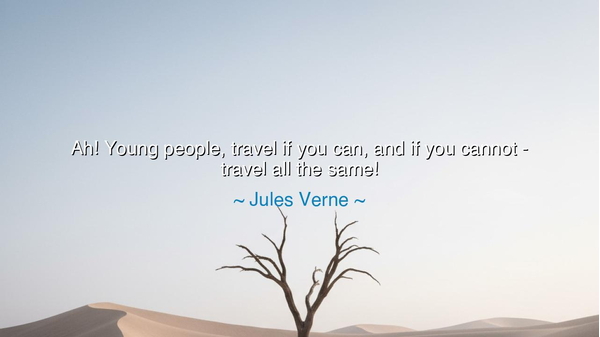
Ah! Young people, travel if you can, and if you cannot - travel






Jules Verne, the dreamer of voyages and the prophet of discovery, once cried out: “Ah! Young people, travel if you can, and if you cannot—travel all the same!” His words ring not as gentle advice, but as a command, a summons, a trumpet-blast calling the restless spirit to rise and seek. For Verne knew that to travel is not merely to move across the surface of the earth—it is to awaken, to break the chains of small horizons, to see the infinite reflected in the faces of strangers, in the breadth of oceans, in the majesty of mountains, and even in the silence of deserts.
The first meaning is plain: Verne implores the young to set out while they still burn with energy and courage. Yet deeper still is his paradoxical cry, “and if you cannot—travel all the same!” What is this if not the recognition that true travel begins not with wealth, nor with ticket or ship, but with the spirit? One may have little, yet still set out; one may lack means, yet still find ways. To travel is to live beyond excuses, to push beyond the walls of comfort, to cross borders both seen and unseen.
The ancients themselves understood this truth. Herodotus, the “father of history,” left his homeland not because it was easy but because curiosity demanded it. Odysseus, though beset by storms, monsters, and gods, pressed onward, his wanderings shaping not only his fate but the very soul of Greek myth. And Alexander, before he was Great, was a boy who dared to ride Bucephalus into the horizon, unafraid to go where none had gone before. Verne stands in their tradition, urging the young to do the same: to claim the inheritance of the road, the sea, and the sky.
History also gives us humbler stories. Think of Marco Polo, whose journey to the East began in youth, when the world beyond Venice was unknown to him. He returned with tales that expanded Europe’s imagination, fueling dreams of lands unseen. Or consider Mary Kingsley, a Victorian woman who defied convention and traveled alone into West Africa, learning the ways of its people and recording knowledge that scholars of her time dared not seek. Their greatness lay not in their means, but in their will to travel all the same.
Verne himself was a man of imagination more than constant motion, yet his novels—Twenty Thousand Leagues Under the Seas, Around the World in Eighty Days, Journey to the Center of the Earth—were maps for the mind, voyages for the soul. He showed that even if the body cannot always go, the spirit must. To travel in thought, in study, in wonder, is also to journey. Thus his command is not merely about ships and trains, but about refusing stagnation, refusing to let the soul rot in stillness. For the greatest journeys may begin with imagination, but they lead us outward, into the vastness of life itself.
The lesson is clear: do not wait for perfect conditions. Do not say, “I cannot afford it,” or, “It is not the right time.” Travel begins with the first step—whether it is to a neighboring village, a library filled with stories, or a distant continent. It is the act of stepping beyond the narrow borders of your own life. To see the world is to see yourself anew, and to encounter the unfamiliar is to discover hidden parts of your own soul.
Practical action follows. If you can, go far—cross seas, climb peaks, wander ancient streets. If you cannot, then travel all the same: walk paths you have not walked, speak to people you have not known, read the writings of foreign lands, taste foods that carry the memory of distant soil. For every act of reaching beyond yourself is a form of travel, and every journey—great or small—etches wisdom into the soul.
Thus Jules Verne’s cry endures like a beacon: *“Ah! *Young people, travel if you can, and if you cannot—travel all the same!” Take it as a charge, as an inheritance, as a sacred duty. For he who travels, whether by foot, by ship, or by imagination, escapes the prison of narrowness and claims the freedom of the world. And in that freedom, the soul learns to soar.






AAdministratorAdministrator
Welcome, honored guests. Please leave a comment, we will respond soon